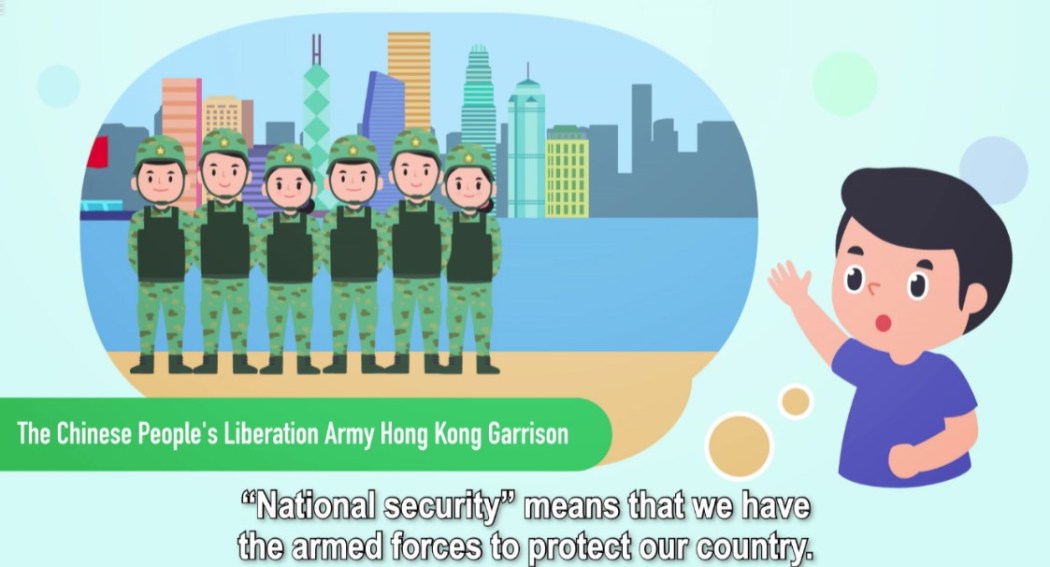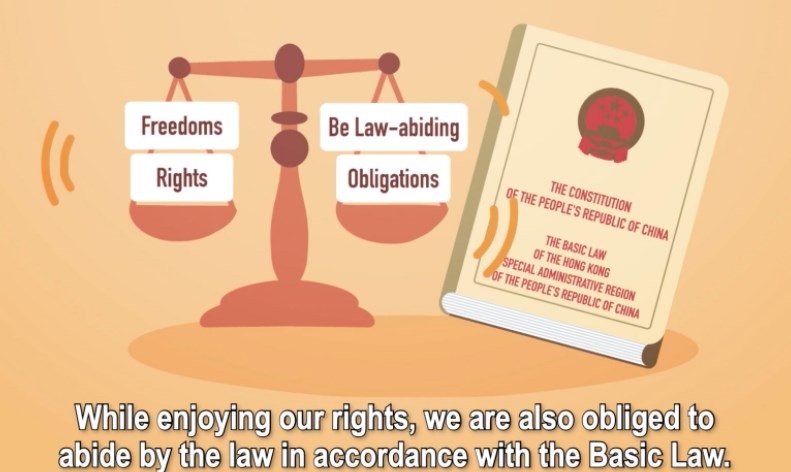Hong Kong Education City Limited, fully owned by the government, is “composed of leaders of the education and business sectors as well as government officials.” I have not heard of any of the worthies on its board, but congratulate them on a noble effort to educate the city’s children about the National Security Law.
The seven-minute video they have created is here. Much as I applaud their efforts, there are a number of aspects on which I hope they will accept some constructive criticism.
The format of the explainer is a cartoon. Japanese anime and manga are very popular, I’m told, amongst the youth of Hong Kong. So perhaps the use of a cartoon is meant to appeal to our youth. Perhaps also my thinking – I have always associated cartoons with fantasy – is out of touch with the times. But I do wonder if a subject as serious as national security is best explained in a format widely associated with trivial fun.

Setting such old-fogey concerns to one side, the video starts with two children sitting on a park bench wondering – as young people do – about national security. One says that national security means that “we have the armed forces to protect our country.” He is quickly corrected by an owl. This wise old bird points out that security is much broader: Technological, Cyber, Cultural, Social, Economic and Ecological as well as Territorial.
It seems to me that we have too many trees and not enough woods. All countries have external and internal security to worry about. China’s external security is, as the cartoon says, in the hands of the People’s Liberation Army. But, as President Xi Jinping himself pointed out at Davos, China’s doesn’t want defence but friends. The nation’s first line of defence is diplomacy; the PLA, though he didn’t say it, is a last resort.
When it comes to internal security, the first line of defence is to make the country such that its citizens feel it is worth securing. I have no doubt that most Chinese citizens believe this is the case, but that’s surely worth more emphasis than one of the examples used: a cyber-security attack on a bank.

The children then go on to agree that we all love Hong Kong, and that “We all hope that our families and people around us can lead a happy and stable life.” That’s all well and good as far as it goes, but those who have experienced freedom tend not to be happy if that freedom is taken away, and stability can become a euphemism for stasis.
And there’s a danger that an inquisitive teenager could wonder if a happy and stable life is enough. Aristotle thought that we aim at a life well-lived and that man is a political animal: there’s more to happiness than gambolling through flower-covered meadows, and more to the well-lived life than doing the same thing day after day. Civic engagement is, to many people, part of the equation, and “happy and stable” alone doesn’t cut it.
Moving on. The cartoon then takes a rather illogical jump from the Covid-19 response to the fact that many other countries have national security laws. No comparison of those laws with Hong Kong’s is offered (strangely, it never is); rather, the cartoon then launches into a detailed, legalistic explanation of how the law was promulgated. Not exactly riveting stuff for the average child – or a human of any age.

After this, and perhaps not surprisingly, the boy utters something that couldn’t possibly be a yawn before asking where the police fit into all this. He is regaled with a detailed answer involving the police, the department of justice and the judiciary, which, we are told, is independent. Rather surprising, given the recent spat over separation of powers.
Onwards. Next come the usual assurances about protections of rights and freedoms, and the promise that the national security law will only affect a “tiny minority.” We aren’t told who that minority is, or – oddly for an educational video – how to avoid becoming part of it.

But it’s okay. It turns out that all we need to do to is “contribute to society” and we will be “law-abiding.” The confused youngster – and in many ways I still am one – has no idea how contributing to society relates to national security. But rights and freedoms, we are told, are not unrestricted. Running around in the classroom will prevent other students from learning; spraying graffiti on other people’s walls is illegal (it would hardly be graffiti otherwise), and playing loud music at night will disturb others.

These acts are inconsiderate and some are illegal, but defacing a wall or cranking K-pop at three in the morning hardly threaten the nation. Nor, come to that, do burglary, common assault, fraud, embezzlement, taking drugs, or any number of other criminal acts. I am not advocating that our youth do any of those, but I am saying that an enquiring youth may wonder what distinguishes these crimes from national security crimes.
“While enjoying our rights, we are also obliged to abide by the law in accordance with the Basic Law,” we are told.
And this, of course, is the nub of the matter. The video is tautological: it only makes sense if you already know what abiding by the national security law means. But nothing in the video informs us. We are not told what acts are secessionist, subversive, terrorist or treasonable. There are no concrete examples, no pithy cases.

Hong Kong people do not live on a rock in a well; many of its young people are citizens of the world. It is right and proper that they be educated not to endanger the security of the nation. But for those with friends in Scotland, whose ruling party advocates secession, or the US, where budget wrangles shut down the government, it may be confusing that such things are humdrum there but undermine national security here. The video does little to answer any such enquiring minds.
This video is a worthy first attempt, but I submit that using a cartoon trivialises the subject matter, that the middle section is so boring that it alienates rather than engages, and that the lack of concrete examples will leave the enquiring student confused rather than informed.
Or is that the point? I, for one, would certainly hope not.
Support HKFP | Policies & Ethics | Error/typo? | Contact Us | Newsletter | Transparency & Annual Report | Apps
| HKFP is an impartial platform & does not necessarily share the views of opinion writers or advertisers. HKFP presents a diversity of views & regularly invites figures across the political spectrum to write for us. Press freedom is guaranteed under the Basic Law, security law, Bill of Rights and Chinese constitution. Opinion pieces aim to point out errors or defects in the government, law or policies, or aim to suggest ideas or alterations via legal means without an intention of hatred, discontent or hostility against the authorities or other communities. |
Help safeguard press freedom & keep HKFP free for all readers by supporting our team

More HKFP OPINION:
HKFP has an impartial stance, transparent funding, and balanced coverage guided by an Ethics Code and Corrections Policy.
Support press freedom & help us surpass 1,000 monthly Patrons: 100% independent, governed by an ethics code & not-for-profit.











